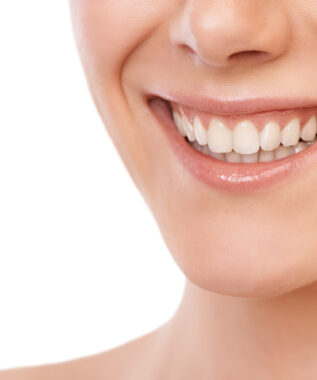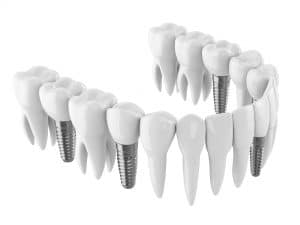 There are many different factors to consider when it comes to rebuilding your smile after tooth loss. For example, the number of teeth you’ve lost will determine what type of restoration is best for replacing them. Also, the potential impact of the loss on your remaining healthy teeth may be significant enough to require additional treatment as part of your smile restoration. However, one factor that people don’t always consider is the quality of the support that their replacement teeth rely on. This can impact everything from the comfort and stability of your restoration to the long-term health and integrity of your dental ridges, which is one reason why dental implants are often preferred for supporting most types of replacement teeth. (more…)
There are many different factors to consider when it comes to rebuilding your smile after tooth loss. For example, the number of teeth you’ve lost will determine what type of restoration is best for replacing them. Also, the potential impact of the loss on your remaining healthy teeth may be significant enough to require additional treatment as part of your smile restoration. However, one factor that people don’t always consider is the quality of the support that their replacement teeth rely on. This can impact everything from the comfort and stability of your restoration to the long-term health and integrity of your dental ridges, which is one reason why dental implants are often preferred for supporting most types of replacement teeth. (more…)
Need Tooth Extraction? Don’t Take It Lightly
 When your dentist tells you that a tooth needs to be extracted, it typically means the tooth has reached a point where saving it with another restorative treatment is no longer possible. Because of this, it can seem like there’s plenty of time to extract the tooth. However, the fact that the tooth can’t be saved doesn’t mean there’s no longer a pressing need to address the problem. Depending on the specific reason why you need tooth extraction, waiting much longer can put much of the rest of your oral health at risk, as well. (more…)
When your dentist tells you that a tooth needs to be extracted, it typically means the tooth has reached a point where saving it with another restorative treatment is no longer possible. Because of this, it can seem like there’s plenty of time to extract the tooth. However, the fact that the tooth can’t be saved doesn’t mean there’s no longer a pressing need to address the problem. Depending on the specific reason why you need tooth extraction, waiting much longer can put much of the rest of your oral health at risk, as well. (more…)
What Restoring Your Smile Could Mean
 Smile restoration has come a long way over the years, and it remains an important part of many people’s lifetime oral health care. When a problem develops with one or more of your teeth, that problem might impact more than just the tooth’s health and integrity. Restoring your smile means thoroughly understanding the full impact of your condition and designing a treatment plan that helps you address it. Today, we look at what restoring your smile could mean if it experiences one of these common concerns, and what the right personalized treatment can help you accomplish. (more…)
Smile restoration has come a long way over the years, and it remains an important part of many people’s lifetime oral health care. When a problem develops with one or more of your teeth, that problem might impact more than just the tooth’s health and integrity. Restoring your smile means thoroughly understanding the full impact of your condition and designing a treatment plan that helps you address it. Today, we look at what restoring your smile could mean if it experiences one of these common concerns, and what the right personalized treatment can help you accomplish. (more…)
How a Dental Crown Gives Your Tooth a Second Chance
 One of the reasons why dental crowns are among the most popular restorative dental treatments is because they can work to address a wide range of different tooth concerns. Another reason is because, in many cases, the restoration can look as natural and lifelike as it performs, offering optimal discretion when restoring your smile. While a dental crown can do many things for your tooth, depending on what it’s needs are, the most important function it provides is giving your tooth a second chance. In cases of tooth damage that require a dental crown to address, the tooth in question is often close to being lost or needing extraction. (more…)
One of the reasons why dental crowns are among the most popular restorative dental treatments is because they can work to address a wide range of different tooth concerns. Another reason is because, in many cases, the restoration can look as natural and lifelike as it performs, offering optimal discretion when restoring your smile. While a dental crown can do many things for your tooth, depending on what it’s needs are, the most important function it provides is giving your tooth a second chance. In cases of tooth damage that require a dental crown to address, the tooth in question is often close to being lost or needing extraction. (more…)
Things You Didn’t Know Tooth Loss Could Cause
 For many people, the loss of a tooth is worrisome all by itself. Not only does it affect their smile’s appearance, but it can also disrupt their bite’s balance and change how their teeth feel when they bite, chew, and speak. However, there are many subsequent problems with your oral health that can result from the continuing consequences of tooth loss, and restoring your smile as soon as possible is the best way to address them. (more…)
For many people, the loss of a tooth is worrisome all by itself. Not only does it affect their smile’s appearance, but it can also disrupt their bite’s balance and change how their teeth feel when they bite, chew, and speak. However, there are many subsequent problems with your oral health that can result from the continuing consequences of tooth loss, and restoring your smile as soon as possible is the best way to address them. (more…)
Why Dental Implants Are Better at Replacing Lost Teeth
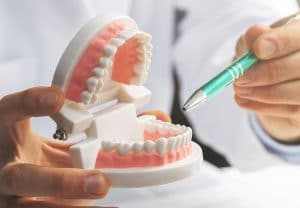 Not all tooth replacement options are the same. For some people, the best solution is to replace a lost tooth, or multiple adjacent teeth, with a custom-designed dental bridge. For others, the dispersed nature of their lost teeth means they’ll need a partial denture to successfully fill the gaps in their smiles. However, what many dental restorations share in common is a need for dental implants to more closely resemble the root can crown structures of your healthy teeth. Dental implants are often better at replacing lost teeth because the loss of the tooth’s is essential to restoring your smile. (more…)
Not all tooth replacement options are the same. For some people, the best solution is to replace a lost tooth, or multiple adjacent teeth, with a custom-designed dental bridge. For others, the dispersed nature of their lost teeth means they’ll need a partial denture to successfully fill the gaps in their smiles. However, what many dental restorations share in common is a need for dental implants to more closely resemble the root can crown structures of your healthy teeth. Dental implants are often better at replacing lost teeth because the loss of the tooth’s is essential to restoring your smile. (more…)
How Obvious Is Your Dental Emergency?
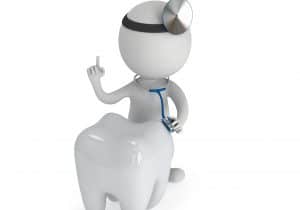 Many people expect a dental emergency to be something dramatic and obvious, like accidental trauma to the tooth or a tooth being knocked out of its socket. Because of this expectation, many people fail to notice signs that their smiles are facing another type of emergency. When you don’t seek treatment for it promptly, the situation can become significantly worse, leading to the need for extensive treatment to fully restore your smile. Today, we explain a few times when your dental emergency isn’t so obvious, and what you can do to better protect your smile from such circumstances. (more…)
Many people expect a dental emergency to be something dramatic and obvious, like accidental trauma to the tooth or a tooth being knocked out of its socket. Because of this expectation, many people fail to notice signs that their smiles are facing another type of emergency. When you don’t seek treatment for it promptly, the situation can become significantly worse, leading to the need for extensive treatment to fully restore your smile. Today, we explain a few times when your dental emergency isn’t so obvious, and what you can do to better protect your smile from such circumstances. (more…)
How High Is Your Risk of Tooth Loss?
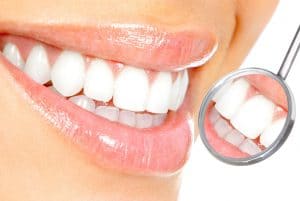 When you take consistently good care of your oral health, including sticking to your daily hygiene schedule and regular dental checkup appointments, you have a much better chance of preserving all of your healthy, natural smile. However, even the most attentive hygiene and preventive dental care routines are no guarantee that you’ll continuously prevent oral health concerns from developing, including those that can often lead to tooth loss. Today, we explore how you can tell if you might be at a higher risk of tooth loss than you realize, and why it’s important to address the concern for the good of your smile and oral health. (more…)
When you take consistently good care of your oral health, including sticking to your daily hygiene schedule and regular dental checkup appointments, you have a much better chance of preserving all of your healthy, natural smile. However, even the most attentive hygiene and preventive dental care routines are no guarantee that you’ll continuously prevent oral health concerns from developing, including those that can often lead to tooth loss. Today, we explore how you can tell if you might be at a higher risk of tooth loss than you realize, and why it’s important to address the concern for the good of your smile and oral health. (more…)
Repairing a Tooth Whose Damage Is Still Minor
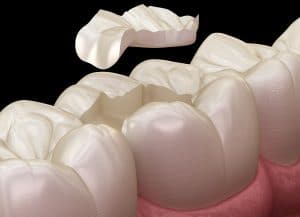 When a tooth has a large fracture in it, or a piece breaks off of its crown structure, then the need to fix the tooth as soon as possible might be obvious. If nothing else, the pain in the tooth may be enough to force you to seek treatment if only to alleviate it. While the symptoms and consequences of tooth damage aren’t always as obvious when the damage is minor, the threat to your tooth’s health and integrity can be just as serious. (more…)
When a tooth has a large fracture in it, or a piece breaks off of its crown structure, then the need to fix the tooth as soon as possible might be obvious. If nothing else, the pain in the tooth may be enough to force you to seek treatment if only to alleviate it. While the symptoms and consequences of tooth damage aren’t always as obvious when the damage is minor, the threat to your tooth’s health and integrity can be just as serious. (more…)
How to Prepare Your Smile for Dental Implants
 When you receive dental implants to replace one or more lost teeth, the implant posts and your natural jawbone structure surrounding it do most of the work. As the bone structure heals, it fuses to the biocompatible implant posts. When this process is complete, the implant posts take on the brunt of your bite’s pressure, supporting your dental restoration and stimulating your jawbone from that point forward. The biocompatibility of dental implants and their success in integrating with your dental ridge makes them the ideal solution in most cases of tooth loss. However, for them to be successful, you may need to prepare your oral health and structures to receive them by addressing one or more existing concerns. (more…)
When you receive dental implants to replace one or more lost teeth, the implant posts and your natural jawbone structure surrounding it do most of the work. As the bone structure heals, it fuses to the biocompatible implant posts. When this process is complete, the implant posts take on the brunt of your bite’s pressure, supporting your dental restoration and stimulating your jawbone from that point forward. The biocompatibility of dental implants and their success in integrating with your dental ridge makes them the ideal solution in most cases of tooth loss. However, for them to be successful, you may need to prepare your oral health and structures to receive them by addressing one or more existing concerns. (more…)




